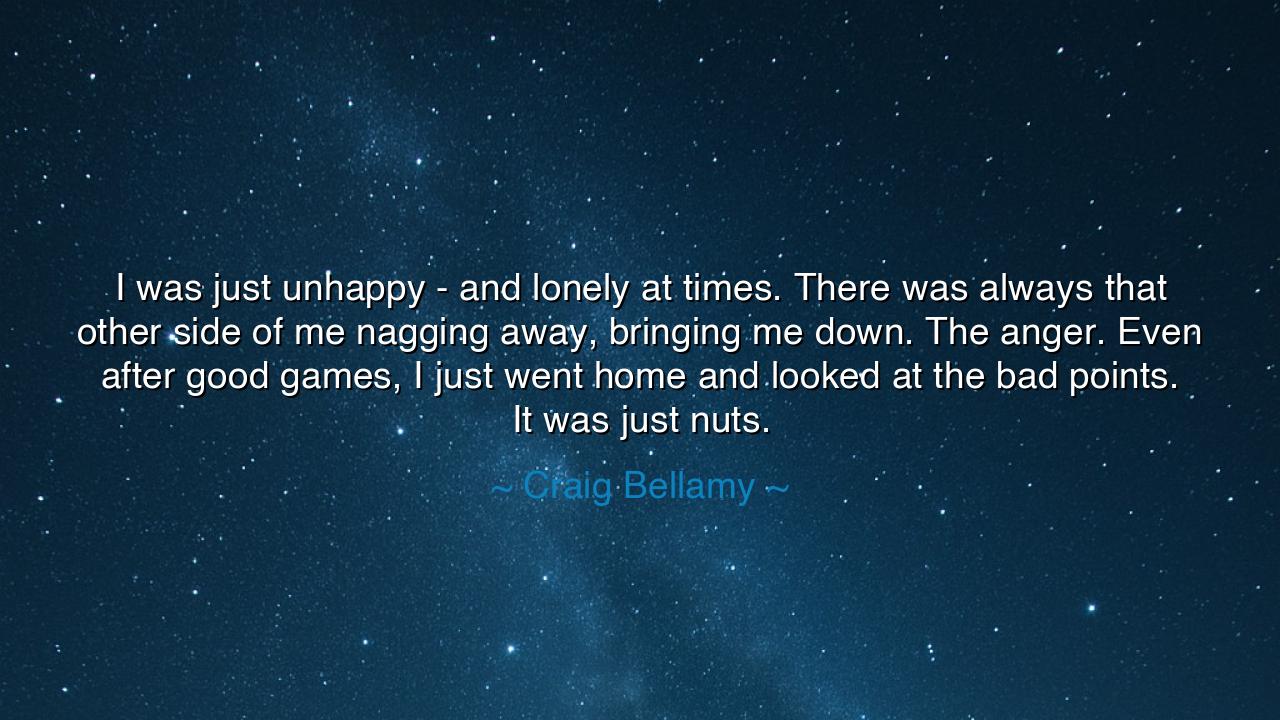
I was just unhappy - and lonely at times. There was always that
I was just unhappy - and lonely at times. There was always that other side of me nagging away, bringing me down. The anger. Even after good games, I just went home and looked at the bad points. It was just nuts.






Host: The late evening cast a soft, melancholic light across the room, the world outside growing darker with the fall of night. Inside, the quiet was thick, like a fog that settled in the space between thoughts. Jack sat at the table, his fingers absentmindedly tapping against the wood, his eyes lost in the reflection of his own thoughts. Jeeny sat nearby, a warm mug of tea in her hands, her gaze focused but gentle, waiting for the conversation to begin.
Jack: “I came across a quote from Craig Bellamy today. He said, ‘I was just unhappy—and lonely at times. There was always that other side of me nagging away, bringing me down. The anger. Even after good games, I just went home and looked at the bad points. It was just nuts.’ It hit me in a strange way. It’s like he’s talking about this inner battle, this conflict between success and the inability to enjoy it. Have you ever felt like that?”
Jeeny: “I think everyone has those moments, Jack. That inner critic that never lets up, no matter how much good happens. For someone like Bellamy, where so much of his life is about performance—about being the best—there’s pressure. You win a game, but all you can think about is what went wrong, what you could have done better. The anger and frustration come from not being able to enjoy the moment, because there’s always this expectation that you need to be perfect.”
Jack: “It sounds like a constant weight, always having that other side of you pointing out the flaws. But why does it feel so much more intense after success? You’d think that’s when you’d feel the relief, the joy of accomplishment.”
Jeeny: “It’s because perfection isn’t achievable, Jack. No matter how successful someone gets, they’ll always feel like there’s more to be done, something they could have done better. For Bellamy, those ‘bad points’ after a game were a reminder that he wasn’t enough, even after a win. It’s like this relentless cycle—no matter how high you get, you’re always chasing something that doesn’t exist.”
Jack: “It’s like the success doesn’t feel like success when you can’t take a moment to appreciate it. The anger comes from not allowing yourself to feel proud of what you’ve done.”
Jeeny: “Exactly. And it’s lonely, too. That feeling of always being at war with yourself—there’s no one else who can see it or feel it. From the outside, Bellamy might have looked like a successful player, someone who had everything together. But inside, he was fighting with this voice, telling him he wasn’t good enough, that there was always something missing. It’s a form of isolation that comes with perfectionism, this fear of not being able to accept your own flaws.”
Jack: “It makes me wonder how much of that is tied to the idea of self-worth. If your worth is based on your performance, on always being better, then there’s no room for failure, no space for just being human. So even when you win, you feel like you’ve still lost.”
Jeeny: “That’s the trap. If you only measure your worth by your achievements or how others perceive you, you’ll always be left feeling empty. Even after a win, you can’t celebrate because you’re too focused on what didn’t go right. Self-worth has to come from something deeper—something that doesn’t rely on external validation or constant perfection.”
Jack: “It’s a tough cycle. You want to do well, but the more you succeed, the more you set yourself up for disappointment, because the bar keeps getting higher. And all the while, you’re battling that voice in your head, telling you it’s still not enough.”
Jeeny: “And it’s exhausting. But acknowledging the struggle is the first step. When you can see that you’re caught in that loop of unrealistic expectations, you can start to change how you respond to your own inner critic. You stop measuring yourself by every flaw and start learning to embrace your successes, even if they’re not perfect.”
Jack: “That’s the hard part, isn’t it? Allowing yourself to enjoy the good moments. We’re so conditioned to move forward that we forget to pause, to take in the accomplishments we’ve made. Maybe Bellamy’s right—it’s nuts, always focusing on the bad points, never giving yourself room to just be proud of the good.”
Jeeny: “It’s all about balance. Perfection doesn’t exist, but there’s value in celebrating the progress, the wins, however small. Anger comes when we deny ourselves the chance to feel good about what we’ve done, to acknowledge how far we’ve come. It’s time to start appreciating the journey, even if we’re not always where we want to be.”
Host: The room fell into a thoughtful silence, the words hanging in the air like an unspoken truth. Jack sat back, his thoughts simmering with the realization that success wasn’t just about winning—it was about finding peace with imperfection, allowing space for self-compassion. Jeeny watched him, knowing that the conversation had shifted something deeper, something that couldn’t be undone.
As the night deepened, the room seemed quieter, calmer—just as the mind can become when the constant battle with oneself finally takes a pause.






AAdministratorAdministrator
Welcome, honored guests. Please leave a comment, we will respond soon